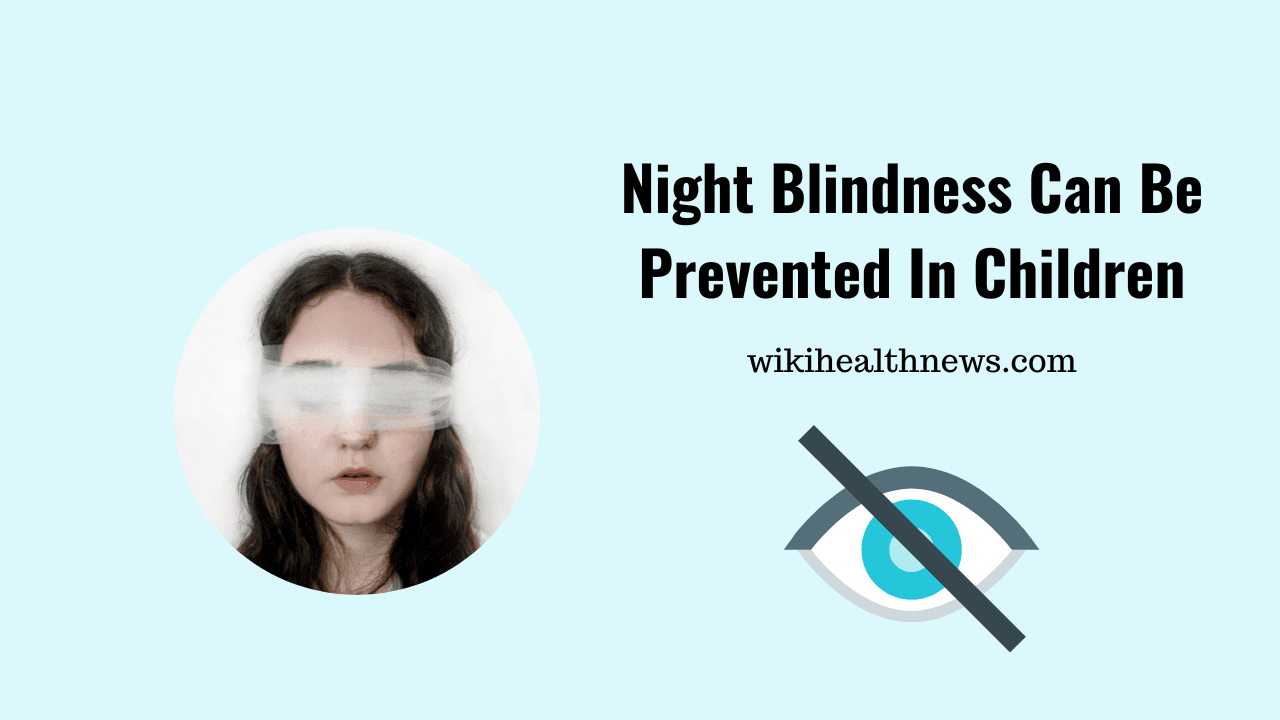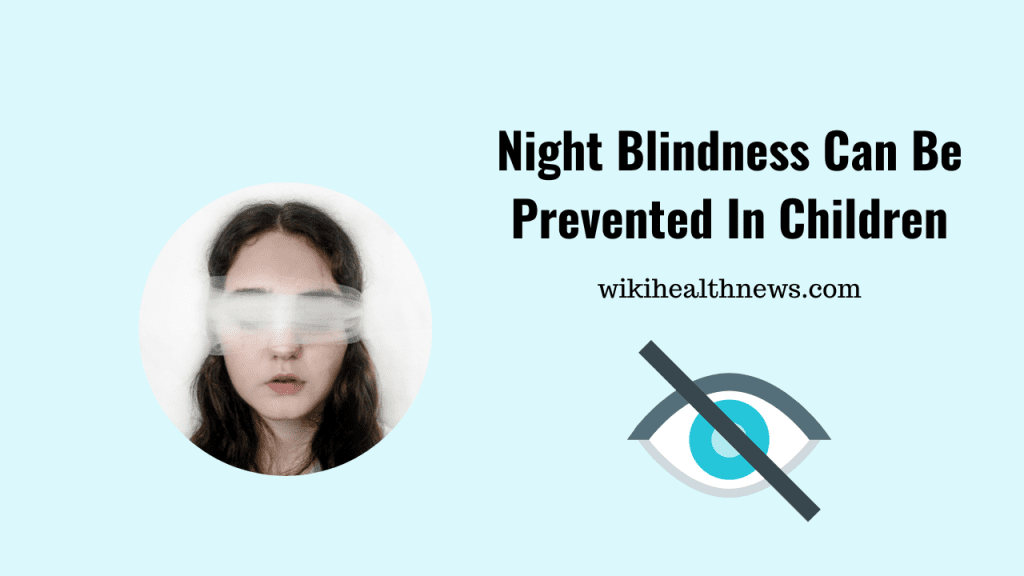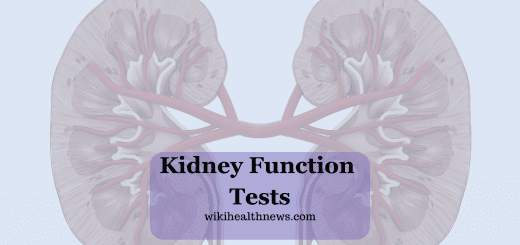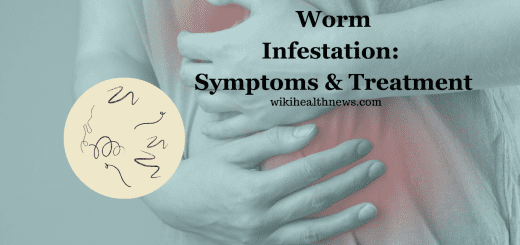Night Blindness Can Be Prevented In Children

Night blindness which is also known as Nyctalopia is impairment of vision at night time or in low light conditions. It is the effect of Vitamin A deficiency and it is reversible and preventable.
Nyctalopia does not mean that one is completely incapable of seeing, but rather means that the vision is compromised or limited vision. It is vitally important that night blindness is not a disease in itself, it is a symptom manifested due to underlying issues like retinal problems. An individual suffering from this disease would find it difficult to watch a movie, or spot stars in sky.
Serious cases include not being able to drive at night while less severe cases may involve a longer time to adapt bright lit environment. Three fourth of the cases of blindness in India are caused due to vitamin deficiencies and are essentially avoidable. The increase in number of cases became a public health concern and National Program for Control of Blindness in India was established to tackle the issues.
Statistics on Night Blindness
- It affects pre-school children and pregnant women mostly. According to reports by WHO, it globally impacts 0.9% of children and 7.8% of pregnant women.
- The proportion of cases of night blindness peaks in developing countries where health and nutrition are a constant problem. In Africa and South East Asia countries account for nearly 2/3rd of the cases.
- This term is actually misleading as it implies that one is sightless at night, but as explained above, it is not the case.
Causes of Night Blindness
It is the symptom of a variety of underlying conditions and it includes:
- Retinis pigmentosa: It is a rare genetic condition which alters the way the eyes respond in dim light. The onset of the disease is in the form of gradual loss of vision characterized by reduced night vision and peripheral vision. The retinal photoreceptor cells begin to degenerate namely the rods and cones. Hence, there is no cure for this disease which ultimately leads to blindness.
- Vitamin A deficiency (VAD) and Xerophthalmia: It is one of the most common causes for this disorder, especially in developing countries like India; deficiency of Vitamin A is high.
- Malnourishment and an imbalanced diet are the root cause of vision deficiency in children. Often the treatment is delayed as children are not accurately attended for symptoms.
- Xerophthalmia is an ailment that is characterized by dryness of the eye membrane and is caused by lack of Vitamin A.
- Cataract: The disease is associated with aged people and involves having a poor vision due to the clouding of the lens of the eye. Night blindness could appear itself as a symptom of cataract.
- Nearsightedness or Myopia: Untreated case of myopia or nearsightedness leads to blurred vision at night time.
- Glaucoma – Medications that used to treat glaucoma can cause this disease.
- Usher syndrome – A genetic condition that involves hearing loss and retinitis pigmentosa.
- Diabetes.
In other cases, like congenital nyctalopia an individual may suffer from night vision impairment by birth.
Symptoms and Signs of Night Blindness
- Trouble in adapting to the dark while driving at night
- Blurry vision that occurs while driving in the dark
- Difficult to see places with dim lighting, like house or in a movie theater
- Excessive blinking and squinting at night
- Trouble adjusting from brighter areas to darker ones
- Inability to see pedestrians walking during night time.
- Reduced contrast sensitivity

Diagnosis of Night Blindness
Certain cases of night blindness are only curable while others are not, depending upon the cause for the onset of the disease.
Eye Examination: Test involves a brief eye examination. It includes the following-
- Tests to measure the visual sharpness, pupillary light reflex and ability to see different colors.
- Refraction test that is used to verify the prescription for spectacles or contact lenses.
- Slit Lamp Examination to identify structural anomalies in front of the eye, including conjunctiva, cornea, lens, iris, eyelids and sclera.
- Retinal Examination uses an instrument called ophthalmoscope. It checks for any injury to the structures in the back of the eye, the choroid, retina, vitreous, optic nerve and retinal detachment.
Other Tests
- Additionally, an Electroretinogram test can be asked for which measures the responses of rods and cones to light.
- Visual field tests may be done to rule out the possibility of other diseases like brain stroke or glaucoma.
Treatment of Night Blindness
- Most often the treatment for poor night vision involves directly treating the underlying condition that is causing night blindness.
- Myopia will be kept under control by the use of vision correction glasses or contact lenses.
- Cataract surgery is a simple procedure that removes the cloudiness on the eye lens and improves vision and reduces night blindness.
- Drugs that might cause night blindness such as Quinidine should be replaced with an alternative drug.
- Individuals suffering from Vitamin A Deficiency should include foods rich in vitamin A. Oral or injectable vitamin A preparations should be administered according to age of the child and severity of disease.
- This condition is irreversible and permanent for individuals who have a birth defect as there is no cure.
- One could be prescribed with eye glasses to enhance vision and could help with driving during night time.
Prevention of Night Blindness
In order to forestall the development of night blindness, the following measures may be followed-
- Include plenty of Vitamin A in the diet like dairy products, egg yolks, fish liver oil, and liver, yellow-green fruits and vegetables like papaya, carrots, mangoes, melons, bell peppers and spinach.
- Regular eye check-ups with an ophthalmologist.
Read more











